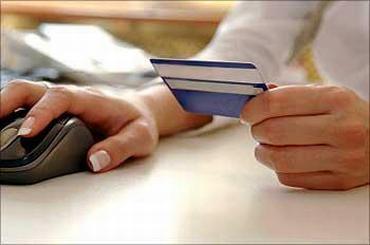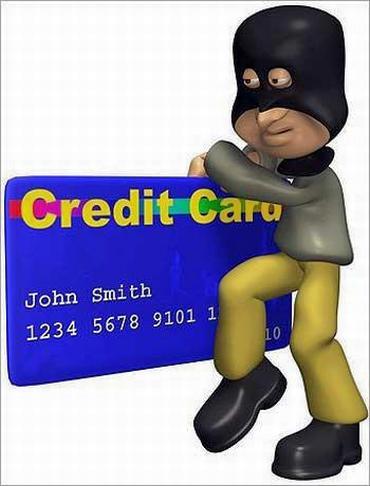Photographs: Rediff Archives Kunnath Santosh
The standard of living of an average middle class Indian has definitely risen over the past decade. Increasing income levels, growing economy, ample job opportunities and easy availability of credit have all led to aspirations and dreams turn into realities. If you look at any upper middle class household in the cities, owning a house, a car, an LCD TV, designer clothes etc is becoming common.
Unlike our past generations, spending has taken priority over saving. And a major contributor to this trend has been the increasing use of plastic money aka credit cards.
A credit card is a very powerful tool. Used wisely, it can help you manage your finances better. On the other hand, an indiscriminate use of the credit card can surely land you in a debt trap. Spending on a credit card does not require you to have money in your bank account. If you have the credit limit, you can spend and that is where the real problem lies. People tend to spend beyond their means and often on things which are not really their needs but their wants or desires. This habit is detrimental to savings since most of your surplus finances would be used to pay off your credit card dues. The temporary pleasure of an extravagance should not come at the cost of your future.
The author is Co-founder and Director, Perfios software Solutions Pvt. Ltd. Perfios (www.perfios.com) offers an online Personal Finance Software Solution that provides a 360 degree view of one's Personal Finance with very little manual effort.
8 WISE ways to use your credit card
Here are eight things you could do to ensure that you use your credit card wisely:
1. Steer clear of the habit of having many credit cards
It is not uncommon to get a call from some bank every other day promoting their credit card and stating how it is better than other cards and to top it, they will offer the card free for life.
Since there is nothing to lose, one often accepts such offers, leading to a plethora of credit cards which are sparsely used. Having multiple credit cards is a bad idea for various reasons -- risk of safety of cards, risk of missing a payment, tracking varied billing cycles, overspending are some of the common fallouts.
Keeping a maximum of two to three cards ensures that you can track them easily and also accumulate more reward points per card.
2. Do not spend beyond your means
Use credit cards judiciously. For regular household expenses, use a debit card or cash. This ensures that you maintain a tight budget and don't go overboard. With the mall culture quickly becoming a way of life, it is very easy to get carried away.
Spending on credit card should be looked at from the point of view of convenience, keeping well in the mind that there should be money in your bank account when your bill comes up for payment.
8 WISE ways to use your credit card
3. Never carry a balance on credit card
Do you know that credit card is the worst form of borrowing? That is because it carries the highest interest rate, almost 24 to 30 per cent a year. While you may think that you can pay the minimum balance and clear the rest over a period of time, it wouldn't take long for the amount to pile up to a burgeoning debt.
No investment can get you that kind of return, so if you have money, pay off your credit card dues before you do anything else. And if you don't have money, it clearly indicates that you are living beyond your means and you need to shape up.
4. Never withdraw cash using credit card
Always use your debit card to withdraw money from your bank account. Withdrawals from bank using credit card come with hefty charges that are best avoided. Except in case of an absolute emergency, refrain from using your credit card to withdraw cash.
8 WISE ways to use your credit card
5. Check your statements before payment of bills
Some people like to set auto payments from their bank accounts to pay credit card bills. While this can help you make your payments on time, if there is a mistake in your bill, you end of paying it nevertheless, perhaps realising it much later.
A good practice is to check each item of your credit card bill before making a payment. This would help you keep a tab on not only the heads of expenditure but also a possible misuse of your card.
6. Immediately block your card if it is lost or stolen
A lost or stolen card can be easily misused. If you lose your credit card, the first thing to do is to call up the bank and get your card deactivated or blocked. In order to do this, you must maintain a list of all your card numbers and keep it safely. If a situation as above were to arise, you do not want to spend time trying to find out what your credit card number was.
8 WISE ways to use your credit card
7. Press for reversal of late payment fee
If you have been paying your credit card bills on time and have a good credit history, you can bargain with the bank for reversal of late payment charges, if at any point of time there has been a delay in paying your bills. You can explain to them the reason for the late payment and there is a good chance that your charges may be reversed.
8. Use online tools to track your credit card transactions and due dates
Online tools, such as Perfios for example, can be used to track your credit cards related transactions. Such tools show you all the details that you would need to know with respect to your credit card -- credit card limit, amount due, due date of payment, minimum amount due, reward points and transactions on your card. It brings about ease of monitoring and by providing timely reminders; it ensures that you do not miss a payment.
Use your credit card diligently and never let it decide your spending pattern. It is your income level and the money in your bank account should be the decisive factor for determining how much to spend.





Comment
article